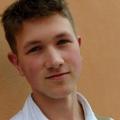
The son of an explosives technician who disarmed a bomb that struck an Ipswich church during World War Two has come to the town to honour his father’s memory.
The 100kg bomb smashed the roof of St Mary at the Quay and lodged itself in the stone floor at the foot of the altar on July 8, 1940.
But fortunately for the church neither that bomb or the other six released on the quay that night exploded.


Mike, 77, has now travelled from Southport to the church with his son, also called Mike, 50, and two grandsons Stephen, 14, and Daniel, 12.

“He had to work for everything, and he was a disciplinarian, but he would do anything for anybody.”
Charles was from Liverpool and worked in street construction before becoming a highways superintendent.
When the war began, he was in the Territorial Army and was sent to the Royal Engineers where he was told he would work on bomb disposal.


“A particular kind of bomb with a fuse called a ZUS 40, had been getting dropped and every time there'd been an attempt to disarm it, it had blown up and taken the man with it,” Mike explained.
“Another one landed and they asked my dad if he'd be prepared to attempt it, and he agreed."
Mike added: “At that time he was married with two children. Also, he knew what the cost was to a family to lose a parent in a war because he never knew his own father as he was killed in 1918 in the First World War.

Charles’ life continued on an impressive path after the war ended as he turned his hand to coaching boxers.
“He coached the first ever ABA champion to come from Liverpool,” said Mike.
The England Boxing National Amateur Championships, previously known as the ABA Championships, is the premier boxing tournament hosted annually by England Boxing.
“He also trained John Conteh as an amateur who was the first person from Liverpool to win a world championship.
“He trained a world champion on the professional side of the game as well, a man called Shea Neary.
“It was a week away from when Neary was going to fight to become the champion that he went into hospital and was diagnosed with cancer, so he didn't get to corner him on the night he won the title.
“He died six weeks later on December 17, 1996."




Comments: Our rules
We want our comments to be a lively and valuable part of our community - a place where readers can debate and engage with the most important local issues. The ability to comment on our stories is a privilege, not a right, however, and that privilege may be withdrawn if it is abused or misused.
Please report any comments that break our rules.
Read the rules hereLast Updated:
Report this comment Cancel